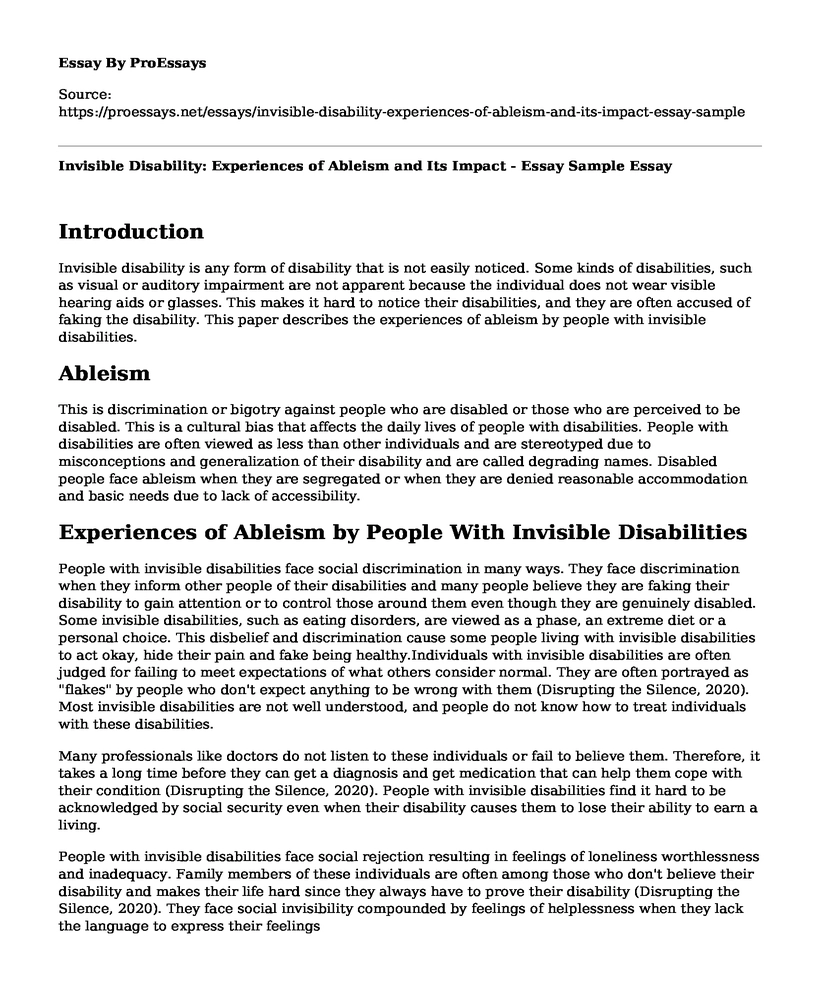Introduction
Invisible disability is any form of disability that is not easily noticed. Some kinds of disabilities, such as visual or auditory impairment are not apparent because the individual does not wear visible hearing aids or glasses. This makes it hard to notice their disabilities, and they are often accused of faking the disability. This paper describes the experiences of ableism by people with invisible disabilities.
Ableism
This is discrimination or bigotry against people who are disabled or those who are perceived to be disabled. This is a cultural bias that affects the daily lives of people with disabilities. People with disabilities are often viewed as less than other individuals and are stereotyped due to misconceptions and generalization of their disability and are called degrading names. Disabled people face ableism when they are segregated or when they are denied reasonable accommodation and basic needs due to lack of accessibility.
Experiences of Ableism by People With Invisible Disabilities
People with invisible disabilities face social discrimination in many ways. They face discrimination when they inform other people of their disabilities and many people believe they are faking their disability to gain attention or to control those around them even though they are genuinely disabled. Some invisible disabilities, such as eating disorders, are viewed as a phase, an extreme diet or a personal choice. This disbelief and discrimination cause some people living with invisible disabilities to act okay, hide their pain and fake being healthy.Individuals with invisible disabilities are often judged for failing to meet expectations of what others consider normal. They are often portrayed as "flakes" by people who don't expect anything to be wrong with them (Disrupting the Silence, 2020). Most invisible disabilities are not well understood, and people do not know how to treat individuals with these disabilities.
Many professionals like doctors do not listen to these individuals or fail to believe them. Therefore, it takes a long time before they can get a diagnosis and get medication that can help them cope with their condition (Disrupting the Silence, 2020). People with invisible disabilities find it hard to be acknowledged by social security even when their disability causes them to lose their ability to earn a living.
People with invisible disabilities face social rejection resulting in feelings of loneliness worthlessness and inadequacy. Family members of these individuals are often among those who don't believe their disability and makes their life hard since they always have to prove their disability (Disrupting the Silence, 2020). They face social invisibility compounded by feelings of helplessness when they lack the language to express their feelings
Impact of Stories of People With Invisible Disabilities
These stories show that many invisible disabilities are not well understood, resulting in disbelief when an individual claim to have a disability. This can be reduced by increasing awareness of these invisible disabilities. Listening to individuals to learn about their condition can help reduce ableism. Treating people with invisible disabilities as an individual with specific needs instead of lumping them in a category can reduce ableism and make them feel socially accepted. People should express concern for these individuals even when they cannot fully understand these conditions.
Conclusion
Many people with invisible disabilities face ableism in their daily lives. They face rejection by their family members and society resulting in feelings of loneliness worthlessness and inadequacy. Institutions also show ableism towards these individuals by lack of accessibility and denying services to these individuals. Increasing awareness of invisible disabilities can help reduce ableism.
References
Disrupting the Silence.(2020, March 28). Retrieved from:https://www.invisibledisabilityproject.org/
Cite this page
Invisible Disability: Experiences of Ableism and Its Impact - Essay Sample. (2023, May 06). Retrieved from https://proessays.net/essays/invisible-disability-experiences-of-ableism-and-its-impact-essay-sample
If you are the original author of this essay and no longer wish to have it published on the ProEssays website, please click below to request its removal:
- Research Paper on Grassroots International Hospital
- Paper Example on Maximizing Performance in Healthcare: Why Project Portfolio Management Matters
- Educating Medical MD Employer Group on Diabetic Management - Essay Sample
- Essay Sample on HIV/AIDS: Individual Discrimination & Its Adverse Effects
- Food Preservation: Retard Microbe Growth & Preserve Quality & Nutrients - Essay Example
- Report Sample on Management Concept in Health Care
- Paper Sample on The Proposed Plan for Diabetes Self-Management







